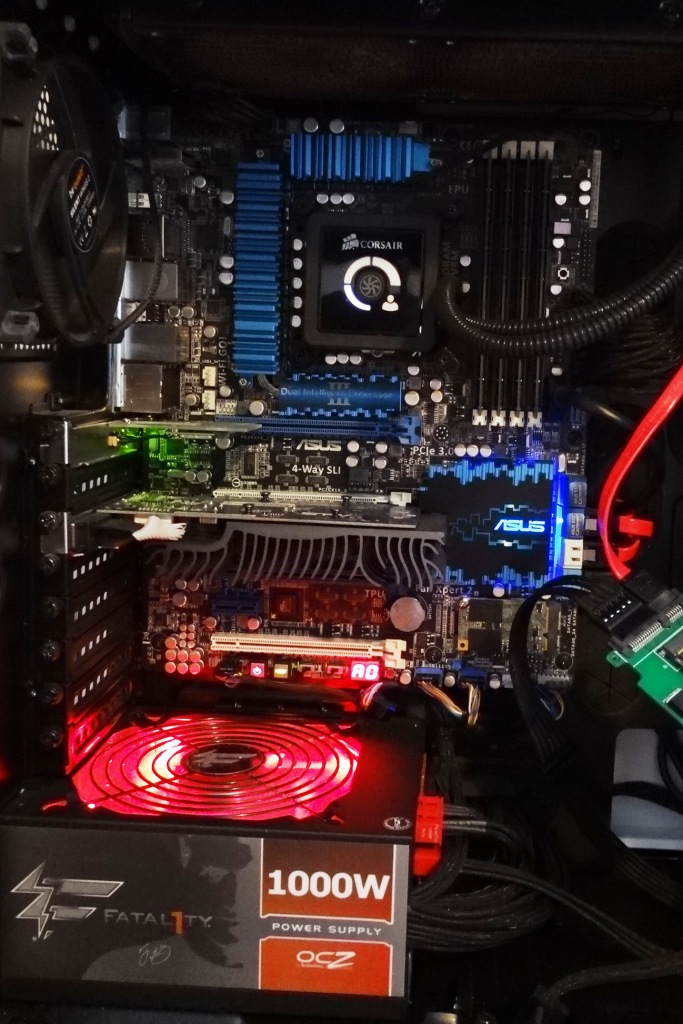TEST BENCH AND PROTOCOL
 Our analysis today will be conducted with our Asus Z77 Premium Test Bench. Clicking on any pictures or benchmarks will bring up a more easily viewable high resolution image.
Our analysis today will be conducted with our Asus Z77 Premium Test Bench. Clicking on any pictures or benchmarks will bring up a more easily viewable high resolution image.
In testing, our main objective is to obtain results as pure and as accurate as possible and we want to ensure that no anomalies slip through. Simply put, we want to provide you with the absolute best results the tested hardware can provide. Repetition in testing is standard and, if necessary, we may conduct specific tests in Windows 7 safe mode to ensure the OS has little to no influence on the end result.
In order to validate and confirm our findings, testing is supported by industry accepted benchmark programs. All results are displayed through capture of the actual benchmark for better understanding of the testing process by the reader.
 We would like to thank ASUS (P8Z77-V Premium
We would like to thank ASUS (P8Z77-V Premium![]()
![]() ), Intel (Core i7-3770K
), Intel (Core i7-3770K![]() ), Crucial (Ballistix
), Crucial (Ballistix![]() ), Corsair (H100
), Corsair (H100![]() ) and Be Quiet (PSU/Fans) for supporting the build of our Z77 Premium Test Bench.
) and Be Quiet (PSU/Fans) for supporting the build of our Z77 Premium Test Bench.
BENCHMARK SOFTWARE
The software we will be using for today’s analysis is typical of many of our reviews and consists of ATTO Disk Benchmark, Crystal DiskMark, AS SSD, Anvil Storage Utilities and PCMark Vantage. We rely on these as they each have a way of supporting one another yet, at the same time, adding a new performance benchmark to the total picture. Much of the software is free and can be downloaded simply by clicking on the linked title.
THE LSI SANDFORCE SF-2281 CONTROLLER
All SSDs are not created equal and many new SSD enthusiasts realize that when they test their new drive to confirm specifications and ensure all is in order. SandForce controlled SSDs, as in the Mushkin Atlas 480GB mSATA SSD we are testing today, use compression techniques in storage whereas many others do not. This creates a bit of confusion when enthusiasts test the drive with random data through benchmarking programs such as AS SSD and Crystal DiskMark. The results seem to be lower than the listed specifications.
The results actually present a false portrayal of the drives ability when compared to other drives such as Samsung, Crucial or Intel. It is for this reason that all of our comparison testing is done through PCMark Vantage. PCMark Vantage HDD Suite simply provides evaluation results based on transfer speeds reached through typical user patterns. Vantage provides a better testing medium, in that, it sees through the typical synthetic benchmarks and provides us with ‘true to life’ results of the drive.
Crystal Disk Info provides some excellent information about the SSD itself to include its health, product information, power on information as well as the characteristics of the SSD. We can see that the Atlas 480GB SSD is capable of TRIM as it is not greyed out, much like AAM.
It was at this point that we learned that the Atlas 480 had most likely been in the hands of another reviewer. The largest clue was the fact that the Atlas mSATA SSD had only been operational in the system for about ten minutes, considerably less than the six hours displayed. We can also see in the firmware version that SF firmware 5.04 is in use.
 The SSD Review The Worlds Dedicated SSD Education and Review Resource |
The SSD Review The Worlds Dedicated SSD Education and Review Resource | 
OMG,what were they thinking….cheap asynchronous NAND flash memory….yikes
3 year warranty is a no-go on a $400 plus part.
still better than TLC flash..
with 128gbit die flash, this will be in the future possbile without the additional 4 flash chios
usually I am very pleased with your tests… in this case – well got me a little confused not to compare this drive to sandisk xtreme 480GB (priced at 328,-€ -> 435$), thinking it would best the atlas (this comment should be deemed non existent if you’d mean best msata 480GB drive)
Mine lasted less than 6 weeks. Completely crashed and can’t do anything with it. I would not recommend this to anyone.
So it looks like the new crucial 480gb mSata is pretty much the same drive?
I don’t quite understand.
Beaten to a pulp by Crucials 480GB mSATA SSD